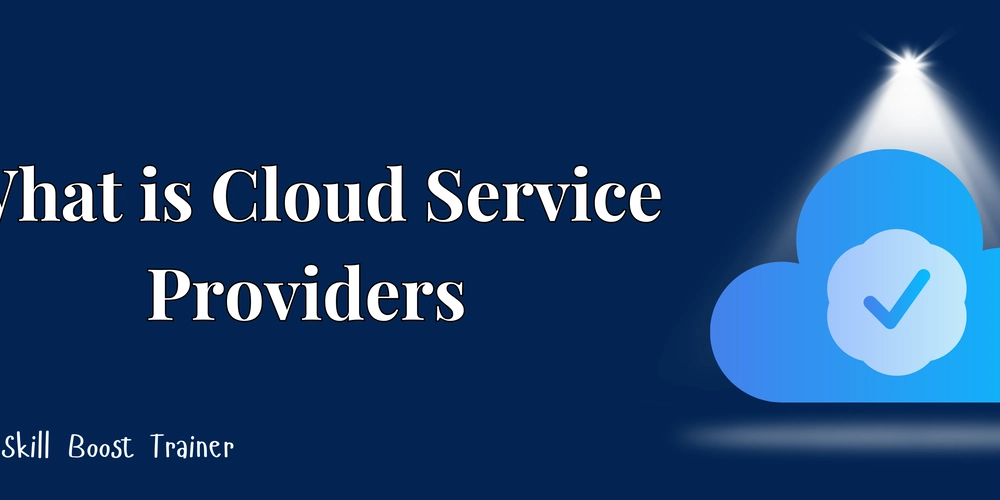What is Cloud Service Providers? Types, Benefits, & Examples
In today’s digital-first world, the role of cloud service providers (CSPs) has become pivotal in enabling businesses to operate more efficiently. By offering various on-demand services such as storage, computing, and networking, CSPs are transforming how organizations manage their resources. This article will explore the types, benefits, and examples of cloud service providers to give you a comprehensive understanding of this essential technology. What is a Cloud Service Provider? A cloud service provider (CSP) is a company that offers computing services—such as servers, storage, databases, networking, software, and analytics—over the internet (the cloud). CSPs enable businesses to avoid the cost and complexity of owning and maintaining physical IT infrastructure. Instead, users can access scalable, on-demand services and pay only for what they use. Types of Cloud Service Providers Cloud service providers typically fall into three main categories based on the services they offer: 1. Infrastructure as a Service (IaaS) IaaS providers deliver virtualized computing resources like servers, storage, and networks on a pay-as-you-go basis. Businesses use IaaS to build and manage their IT infrastructure without the need to own physical hardware. Examples: Amazon Web Services (AWS): Offers Elastic Compute Cloud (EC2) for virtual machines and Simple Storage Service (S3) for data storage. Microsoft Azure: Provides Virtual Machines and Blob Storage. Google Cloud Platform (GCP): Features Compute Engine and Cloud Storage. 2. Platform as a Service (PaaS) PaaS provides a platform for developers to build, deploy, and manage applications. It includes tools, frameworks, and pre-configured environments to streamline the development process. Examples: Heroku: Simplifies app deployment and management. Google App Engine: A serverless platform for building scalable web applications. Red Hat OpenShift: A Kubernetes-based platform for containerized applications. 3. Software as a Service (SaaS) SaaS providers deliver software applications over the internet, eliminating the need for installation and maintenance. Examples: Salesforce: Offers CRM tools to manage customer relationships. Microsoft Office 365: Provides cloud-based productivity applications. Dropbox: Facilitates file sharing and collaboration. Benefits of Using Cloud Service Providers Adopting cloud services can bring numerous advantages to businesses. Here are some of the key benefits: 1. Cost Efficiency CSPs operate on a pay-as-you-go model, allowing businesses to save on hardware, maintenance, and energy costs. 2. Scalability Cloud services can scale resources up or down based on demand, ensuring businesses only use what they need. 3. Flexibility Cloud solutions enable users to access services from anywhere with an internet connection, fostering remote work and collaboration. 4. Reliability CSPs often guarantee high uptime and include disaster recovery features to minimize downtime. 5. Security Many CSPs offer advanced security features like encryption, firewalls, and compliance certifications to protect sensitive data. 6. Innovation Cloud platforms provide access to cutting-edge technologies such as artificial intelligence, machine learning, and big data analytics. Examples of Cloud Service Providers Here are some of the top cloud service providers and their key offerings: 1. Amazon Web Services (AWS) Dominates the market with over 200 fully-featured services. Popular services: EC2 (computing), S3 (storage), and Lambda (serverless computing). 2. Microsoft Azure Known for its hybrid cloud capabilities. Popular services: Azure Virtual Machines, Azure Cosmos DB. 3. Google Cloud Platform (GCP) Excels in AI and machine learning. Popular services: BigQuery (data analytics), Kubernetes Engine (container orchestration). 4. IBM Cloud Focuses on AI-driven cloud solutions. Popular services: Watson AI, IBM Cloud Kubernetes Service. 5. Oracle Cloud Offers database-centric cloud services. Popular services: Oracle Autonomous Database, OCI Compute. Key Considerations When Choosing a Cloud Service Provider When selecting a CSP, consider the following factors: Pricing Models: Ensure the costs align with your budget and needs. Security: Look for providers with robust security measures and compliance certifications. Reliability: Assess uptime guarantees and customer reviews. Integration: Ensure compatibility with your existing systems. Support: Opt for providers offering responsive customer service. Conclusion Cloud service providers are revolutionizing the way businesses operate by offering scalable, cost-effective, and innovative solutions. By understanding the types and benefits of CSPs, organizations can make informed decisio

In today’s digital-first world, the role of cloud service providers (CSPs) has become pivotal in enabling businesses to operate more efficiently. By offering various on-demand services such as storage, computing, and networking, CSPs are transforming how organizations manage their resources. This article will explore the types, benefits, and examples of cloud service providers to give you a comprehensive understanding of this essential technology.
What is a Cloud Service Provider?
A cloud service provider (CSP) is a company that offers computing services—such as servers, storage, databases, networking, software, and analytics—over the internet (the cloud). CSPs enable businesses to avoid the cost and complexity of owning and maintaining physical IT infrastructure. Instead, users can access scalable, on-demand services and pay only for what they use.
Types of Cloud Service Providers
Cloud service providers typically fall into three main categories based on the services they offer:
1. Infrastructure as a Service (IaaS)
IaaS providers deliver virtualized computing resources like servers, storage, and networks on a pay-as-you-go basis. Businesses use IaaS to build and manage their IT infrastructure without the need to own physical hardware.
Examples:
- Amazon Web Services (AWS): Offers Elastic Compute Cloud (EC2) for virtual machines and Simple Storage Service (S3) for data storage.
- Microsoft Azure: Provides Virtual Machines and Blob Storage.
- Google Cloud Platform (GCP): Features Compute Engine and Cloud Storage.
2. Platform as a Service (PaaS)
PaaS provides a platform for developers to build, deploy, and manage applications. It includes tools, frameworks, and pre-configured environments to streamline the development process.
Examples:
- Heroku: Simplifies app deployment and management.
- Google App Engine: A serverless platform for building scalable web applications.
- Red Hat OpenShift: A Kubernetes-based platform for containerized applications.
3. Software as a Service (SaaS)
SaaS providers deliver software applications over the internet, eliminating the need for installation and maintenance.
Examples:
- Salesforce: Offers CRM tools to manage customer relationships.
- Microsoft Office 365: Provides cloud-based productivity applications.
- Dropbox: Facilitates file sharing and collaboration.
Benefits of Using Cloud Service Providers
Adopting cloud services can bring numerous advantages to businesses. Here are some of the key benefits:
1. Cost Efficiency
CSPs operate on a pay-as-you-go model, allowing businesses to save on hardware, maintenance, and energy costs.
2. Scalability
Cloud services can scale resources up or down based on demand, ensuring businesses only use what they need.
3. Flexibility
Cloud solutions enable users to access services from anywhere with an internet connection, fostering remote work and collaboration.
4. Reliability
CSPs often guarantee high uptime and include disaster recovery features to minimize downtime.
5. Security
Many CSPs offer advanced security features like encryption, firewalls, and compliance certifications to protect sensitive data.
6. Innovation
Cloud platforms provide access to cutting-edge technologies such as artificial intelligence, machine learning, and big data analytics.
Examples of Cloud Service Providers
Here are some of the top cloud service providers and their key offerings:
1. Amazon Web Services (AWS)
Dominates the market with over 200 fully-featured services.
Popular services: EC2 (computing), S3 (storage), and Lambda (serverless computing).
2. Microsoft Azure
Known for its hybrid cloud capabilities.
Popular services: Azure Virtual Machines, Azure Cosmos DB.
3. Google Cloud Platform (GCP)
Excels in AI and machine learning.
Popular services: BigQuery (data analytics), Kubernetes Engine (container orchestration).
4. IBM Cloud
Focuses on AI-driven cloud solutions.
Popular services: Watson AI, IBM Cloud Kubernetes Service.
5. Oracle Cloud
Offers database-centric cloud services.
Popular services: Oracle Autonomous Database, OCI Compute.
Key Considerations When Choosing a Cloud Service Provider
When selecting a CSP, consider the following factors:
- Pricing Models: Ensure the costs align with your budget and needs.
- Security: Look for providers with robust security measures and compliance certifications.
- Reliability: Assess uptime guarantees and customer reviews.
- Integration: Ensure compatibility with your existing systems.
- Support: Opt for providers offering responsive customer service.
Conclusion
Cloud service providers are revolutionizing the way businesses operate by offering scalable, cost-effective, and innovative solutions. By understanding the types and benefits of CSPs, organizations can make informed decisions and leverage the full potential of cloud computing.Want to get greater insights into AWS architecture? Enrolling in the AWS Solution Architect course can be beneficial.
Frequently Asked Questions (FAQs)
1. Who are the big 3 cloud providers?
The big three cloud providers are Amazon Web Services (AWS), Microsoft Azure, and Google Cloud Platform (GCP). These companies lead the market with extensive services, global infrastructure, and innovative solutions, serving businesses of all sizes.
2. Who is dominating cloud?
Amazon Web Services (AWS) dominates the cloud industry with the largest market share, followed by Microsoft Azure and Google Cloud Platform. AWS’s extensive range of services and global data centers give it a significant edge over competitors.
3. What company is the leader in cloud computing?
Amazon Web Services (AWS) is the undisputed leader in cloud computing, known for its scalability, reliability, and diverse offerings, including over 200 services in computing, storage, and AI.
4. Does Netflix use AWS?
Yes, Netflix uses AWS extensively for its global streaming services. AWS provides the scalability and reliability Netflix needs to deliver content seamlessly to millions of users worldwide.
5. Which cloud has the highest demand?
AWS has the highest demand due to its comprehensive services and dominance in the market. However, Microsoft Azure and Google Cloud Platform are also rapidly gaining traction, particularly in hybrid cloud and AI-driven solutions.






















/cdn.vox-cdn.com/uploads/chorus_asset/file/25829976/STK051_TIKTOKBAN_B_CVirginia_B.jpg)













/cdn.vox-cdn.com/uploads/chorus_asset/file/24435316/STK150_Bing_AI_Chatbot_02.jpg)








































